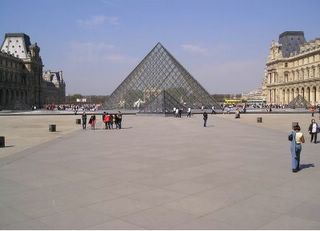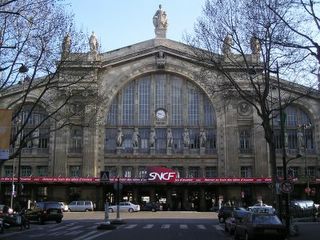April 2 13:00
I am in Le Dauphin restaurant just near the Louvre. I saw this restaurant once before - on the internet, where for some reason I fixed on it - but had no idea I would stumble upon it. I walked down the street, determined to sit myself down at the first suitable restaurant and there it was. I think it's a sign. Of what? That I am living some sort of strangely accessed hyperreality - i.e., things are on track ...
I left the hotel this morning just before ten - walked around the area a bit looking for a bookshop: couldnt find even one. Lots of African people, both black and Arabic, in the area (must be a kind of 'African quarter') - strayed as far as Poisonniere metro before deciding I'm better off trying again nearer to where I want to be.
I got my French-English mini dictionnaire at Forums des Halles eventually [at a place called FNAC]. At the only two bookshops I stopped by there was, in both cases, a special section for psychoanalysis. Must be Lacan or something - the English are not so into Freud and friends.
13:43
The Louvre is enormous. I never realised how big it is - no other art museum I've been to even comes close. I didn't go inside, that would take too long.

Le Grand Louvre
I need to get some Lancome products for L, she asked me to look for them over here. I saw at least one in a duty free shop not far from here.
I'm debating whether to have a whiskey or a coffee after my delicious pate and bread lunch. Probably coffee, And then try to read a poem from the little Gerard de Nerval collection I bought.
The Parisian women are gorgeous.
16:37
I'm sitting in Le Bouledogue (The Bulldog), a little brasserie in Rue Rambuteau (I think) close to Centre Pompidou. CP is a funny-looking building - all pipes show on the outside. It's not exactly pretty but I guess it makes some sort of statement [it houses modern art - one of the largest exhibitions in Europe I believe]. It's warm, that's amazing, walking along the Seine from the Louvre I went down to the riverside where people roll up their trousers and take off their shirts to bask in the sun.
I've heard it said before that the French are more gender-integrated than their English counterparts (the English historically separated the sexes much more - there were gentlemen's clubs and all sorts of men-only group activities). Well, to my mind it is true. The French appear more at ease with their sexuality. Maybe the fact that they have separate sections for psychoanalysis in their bookshops should tell me that they take sexual liberation seriously! Then again, don't count out the effect of my imagination.
Paris at first struck me as not being nearly as busy as London, and certainly without quite that metropolitan feel to it. But certain areas are pretty congested all the same.
19:39
Haha, I've just miraculously (but unintentionally) managed to avoid talking to anyone interesting at this brasserie. I had two opportunities, the one a lady sitting at a bar with an empty seat next to her, and the waitress. I greeted the waitress as I came in (or she greeted me, first), went straight to the bar, bought a whiskey, and came and sat down at a table. Dang! When the waitress served the table next to me she started talking to me in French, from what I understood she means my actions don't make sense, I was at the bar and now I'm here? Indeed, they don't make sense. [I later figured out that this was probably a bigger social blunder than I'd realised - I figured it's normal to pay for your drink at the bar then sit down where you like, but she must have thought I'm a rude stingy foreigner, 'cause she expected to wait on me]
As I walked from the Eiffel tower down the Eiffel tower gardens path, and finally past the peace monument, a bunch of guys stopped me. One guy, dressed in shorts, funny shoes, an orange shirt and some sort of lingerie on his head, had to sing to me a song with his guitar, in English (he tried a broken version of The Beatles' Let It Be) because he is getting married in two weeks' time. Must be his stag party, but what a strange ritual. And I had to pay him a Euro afterwards. I have a picture as evidence of this strange encounter.
The Eiffel tower looks pretty much like you'd expect. Which is nice. And there are views from different sides.

Eiffel Tower from Pont d Iena
I was tempted to "do something" tonight, but I think I'm just going to loaf. Have a nice dinner, good coffee, watch the Eiffel tower lit up at night, then take the metro to Gare du Nord and have a nightcap somewhere near the hotel.
This is the life. If only I had company.
3 April 00:53
As I sat down to have dinner a guy at another table - an American from the West Coast - hears me speaking English and invites me to join him at his table. At first I don't but then chit-chat a bit and we start conversing a little and eventually I decide to join him. He's here on business but his wife couldn't join him.
We end up having a long, interesting conversation about all sorts of things. He tells me things about America I didn't know, for instance how Montana used to be a kind of agrarian society where freedom was possible in a major way - in large part due to the distances between farms and people. So people couldn't really be bothered with one another or what they did in their own places. We were talking about society and freedom and such, and he pointed out how population density has really complicated people's ability to do what they want - social freedoms vs social rights.
This is the second synchronous event this weekend (just after saying how I wouldn't mind having company) - Le Dauphin was the first (I mean, in all of Paris! I should "by accident" bump into it?? for lunch).
11:24
Brunch in Montparnasse. I'm looking out on Galeries Lafayette, from La Tour: Creperie - Cafe - Brasserie. I just love the way Parisian cafes always have seating facing the street - and it's warm enough that I can sit here. I opted for a quick metro tour of the city - if you take lines 1 and 6 you can circle the entire city centre and since it sometimes goes above ground you actually get to see something. Sadly though it's only partly satisfying so I got off here. Walking is much better.
I just saw the L'Open Tour bus go past - open air seating at the top. Bar walking that's probably the best for a crash course view of the city.
15:13

Gare du Nord entrance
The end of my Parisian adventure. I've decided that I like the French, and I like Paris. The French have something that I would like to rub off on me a little. As there is lots to see of Paris still that is a good reason to come again.
I made a last stop in the little Ile de la Cite (Island of the City) on the way to Gare du Nord, snatched a view of Notre Dame - majestic, but only saw it from the one side.
Now in the Eurostar I've got a windowseat (again) and in broad daylight this time I get to see something of the countryside. Lots of little French villages with visible churches - different architecture to the churches in England though. But so many churches! I've seen 5 or 6 in the last 5 minutes, each in a different village, practically walking distance from the other.
Paris feels really European. I didn't notice it in the first bit so much, but some time later yesterday it started filtering through - somewhere between seeing so many cyclists and rollerbladers, old world architecture, and civilised expressions. Oh that's another thing, the Parisian French are much better behaved than their British counterparts in London. You can usually tell with the kids - and the little Brit brats, oh man, nevermind.
[but I like the English anyway, kids and all :-) today as I was telling some of my colleagues about Paris, the one - an Englishman - jokingly said: "Paris is a lovely city, pity about the inhabitants though." He was joking and I managed to laugh, but you can tell there is some age-old rivalry and animosity in the stereotype.]



